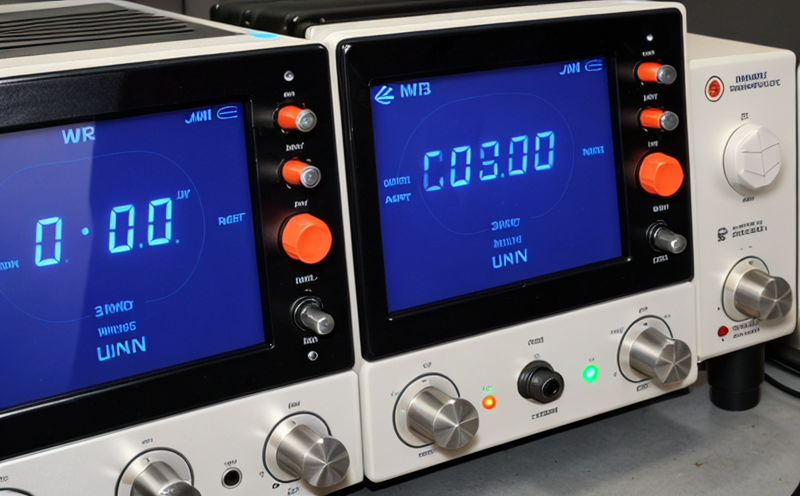UL 1577 Isolation and RF Safety in IoT Circuits Testing
The UL 1577 standard is a critical component of ensuring the safety and reliability of isolation and radiofrequency (RF) circuits used in Internet of Things (IoT) devices. This standard covers various types of isolation transformers, including magnetic isolators and optocouplers, which are essential for providing electrical insulation while maintaining communication between different parts of an electronic circuit. Compliance with UL 1577 ensures that the products meet stringent safety requirements to protect users from harmful voltages and RF emissions.
The standard addresses multiple aspects of isolation transformers and optocouplers, including their design, construction, performance, and labeling. It mandates rigorous testing procedures to ensure these components can withstand potential failures without compromising user safety. The testing process involves evaluating the insulation resistance, dielectric strength, and RF immunity of the devices under various environmental conditions.
One key aspect of UL 1577 is its requirement for manufacturers to provide detailed documentation about their products' compliance with this standard. This includes information on how the isolation transformers and optocouplers are designed to prevent electrical hazards. Additionally, it specifies that these components must be labeled appropriately to inform users of any potential risks associated with improper use.
Compliance with UL 1577 is particularly important for manufacturers of IoT devices because many such products incorporate wireless communication capabilities that can interfere with other electronic systems if not properly isolated or shielded from RF emissions. By ensuring strict adherence to this standard, companies can demonstrate their commitment to producing safe and reliable products that meet industry standards.
In summary, UL 1577 plays a crucial role in safeguarding users by mandating thorough testing of isolation transformers and optocouplers used in IoT devices. This ensures these components are robust enough to maintain electrical insulation while simultaneously allowing for effective data transfer over wireless networks. Adhering to this standard helps protect consumers from potential hazards associated with malfunctioning electronic circuits.
Why Choose This Test
- Comprehensive evaluation of isolation transformers and optocouplers used in IoT devices.
- Ensures compliance with UL 1577 standards, enhancing product safety and reliability.
- Provides detailed documentation on how the components are designed to prevent electrical hazards.
- Includes rigorous testing procedures for insulation resistance, dielectric strength, and RF immunity.
- Avoids potential interference between different electronic systems through proper isolation techniques.
Customer Impact and Satisfaction
Compliance with UL 1577 brings significant benefits to both manufacturers and end-users of IoT devices. For customers, it means having products that are safer and more reliable, reducing the risk of electrical accidents or data breaches due to improper isolation measures. This contributes positively towards enhancing overall consumer confidence in smart home technology.
For businesses looking into expanding their product offerings within the IoT sector, ensuring compliance with UL 1577 demonstrates a strong commitment to quality control and safety protocols. It also opens up opportunities for entering new markets where regulatory compliance is stringent.
Achieving certification can significantly boost brand reputation as it signals adherence to international best practices in electrical engineering. Moreover, having an independently verified certificate of conformance helps build trust among potential partners or investors who value transparency and reliability in business operations.
Use Cases and Application Examples
The UL 1577 standard finds application across various IoT device categories such as smart thermostats, security cameras, home automation systems, wearable devices, and connected appliances. Each of these applications requires effective isolation between power circuits and data communication channels to ensure safe operation.
- Smart Thermostats: Ensures accurate temperature control while preventing accidental short circuits or overheating issues caused by improper electrical connections.
- Security Cameras: Provides secure video streaming services without interfering with other household electronics, thus maintaining high-quality recordings even during power surges.
- Home Automation Systems: Enables seamless integration of multiple devices into a single network while safeguarding against unauthorized access attempts via RF signals.
- Wearable Devices: Guarantees long battery life and enhanced sensor performance through efficient power management techniques implemented using compliant isolation transformers.
- Connected Appliances: Facilitates remote monitoring capabilities for appliances like refrigerators or washing machines, allowing users to receive notifications about potential malfunctions before they become serious problems.
By incorporating UL 1577-compliant isolation and RF safety features into their designs, manufacturers can create robust IoT solutions that not only meet regulatory requirements but also offer superior performance and durability over extended periods of use.





